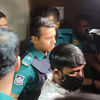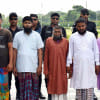A year of attacks, rise of militancy
Last year was one of the worst in a decade in terms of suspected militant attacks in Bangladesh.
Bangladesh saw frequent attacks and a lack of commitment on the government's part to wage a proper war on militancy, security analysts said.
The frequent attacks and busting of militants' dens with stockpiles of explosives in Mirpur and Chittagong tell how the militants have reorganised. Sophisticated firearms have been discovered in the dens where they also made improvised grenades.
Suspected militants hacked to death at least five bloggers and publishers and eight others were killed in attacks on religious sects in 2015. Alleged militants also killed eight people during a bank robbery last year.
What's worst, the militants have even launched a suicide attack on an Ahmadiyya mosque.
Bangladesh was also stunned by the killing of two foreign nationals.
Police claim that one of the murders was done by Jama'atul Mujahideen Bangladesh.
The operatives of the banned militant outfit also allegedly killed two policemen at checkpoints. There were also attacks on Christian priests and those who revered shrines.
After each attack, law enforcers make a handful of arrests but the attacks continue.
When countries around the world using state-of-the-art technologies were struggling to combat militants, Bangladesh over the years seemed reluctant to develop a specialised force equipped with modern technology to combat this menace.
Its actions were limited to rhetoric and largely on-paper, giving the militants the opportunity to spread their network.
The proposal for a National Police Bureau of Counter Terrorism, for example, had been virtually shelved for five years, and a nationwide campaign to create public awareness against radicalism lost steam years ago.
A nationwide socio-political and religious campaign involving imams and teachers initiated by the caretaker government in 2007-08 had fizzled out.
Under the campaign, anti-militancy sermons in mosques and statements at schools, screening plays and documentaries on TV and in public places to educate people about the evils of extremism were considered effective tools to fight terrorism. But the campaign did not continue.
The fight against rising extremism achieves little result due to a general inability of the masses, and even a section of law enforcers, to differentiate religion from radicalism and poor political will of the government, and law enforcers, claimed security analysts.
Of late, the government did form a 600-men specialised unit “Counter Terrorism and Transnational Crime” under the Dhaka Metropolitan Police to enhance the police capability.
Recently, a campaign to collect signatures of one lakh clerics in favour of a fatwa against terrorism has started. Besides, police met with clerics and scholars requesting them to get involved in the anti-militancy campaign.
Law enforcers struggle with multiple problems; inefficiency, lack of logistics, infighting, non-sharing of intelligence, security analysts said adding that they have no capacity-building on counterterrorism.
Militant outfits had changed their techniques and were using technology to spread radicalism and grow their networks, but the law enforcers were still largely dependent on traditional methods.
The law enforcers are poorly trained and lack the skill to counter militants and those who have training are posted for other jobs, said a number of police officials with experience in dealing with militancy.
Security analyst Brig Gen (retd) Sakhawat Hussain said political vacuum, improper investigations, lack of coordination among different law enforcement agencies, and failure of intelligence gathering were the main obstacles to combating militancy effectively.
“Problems that are supposed to be resolved politically or socially are not being solved,” he said, adding militancy could not be stopped through the application of force only.
He said, “The menace needed to be addressed through a properly trained appropriate force. But we do not have such a force.”
Another security analyst Prof Zia Rahman of Criminology Department of Dhaka University recommended bringing a change in the curriculum of madrasa education system, with more positive community activities and a strong social support system, to combat militancy.
He said the government claim of war against militancy was like a “political rhetoric” and some steps to counter militancy were taken rather hurriedly without the much needed engagement of experts and discussion with stakeholders.
“A long-term plan should be taken engaging experts and involving all stakeholders and its proper monitoring is needed to combat militancy,” he told The Daily Star recently.
Both the analysts said they believe militancy would never be a problem in Bangladesh like it was in Syria, Iraq, Pakistan or Afghanistan.

 For all latest news, follow The Daily Star's Google News channel.
For all latest news, follow The Daily Star's Google News channel. 








Comments